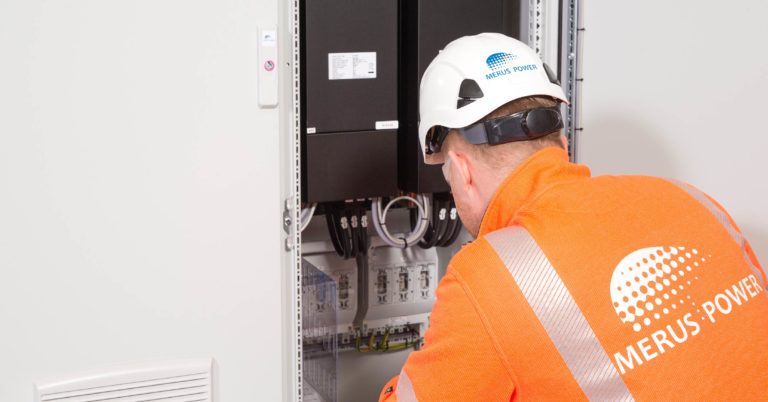Merus® HPQ – Hybrid Power Quality
Merus® HPQ is an all-in-one power quality system for combined active harmonic mitigation and power factor correction.

Large stadiums often face challenges related to harmonic issues due to their complex electrical systems and high-power demand. They can cause various problems, including equipment malfunctions and increased energy consumption. Non-linear loads, such as electronic scoreboards, LED displays, sound systems, and lighting fixtures, draw current in a non-sinusoidal manner, resulting in harmonic distortion.
The distortions can also impose additional stress on electrical equipment, such as transformers, switchgear, and cables. Increased heat dissipation and insulation degradation caused by harmonics can lead to equipment failures, reduced lifespan, and higher maintenance costs. The resonance phenomenon can occur when the frequency of the harmonic distortion matches the natural frequency of certain components, resulting in excessive vibrations and potential mechanical failures.
Carlton Football Club aimed to enhance the existing facilities at IKON Park in Australia. This redevelopment aimed to establish IKON Park as the primary hub for Women’s football and the long-term headquarters of the Carlton Football Club, aligning with broader government initiatives focusing on diversity, education, health and wellbeing, equality, inclusion, and safety.
The high-power demand of the building, particularly during events and peak usage periods, placed additional strain on the electrical infrastructure. The existing power factor was below the desired level, impacting the overall efficiency and energy consumption of the building. Low power factor leads to increased electrical losses, higher utility costs, and reduced equipment performance.
The selected solution was Merus® HPQ – Hybrid Power Quality Compensator, which effectively improves power quality and reduces reactive power demand at the Point of Common Coupling (PCC). These systems were designed with expandability in mind, allowing for future scalability if needed.
Throughout the decision-making process, the availability of local engineering support from our esteemed partner Ampcontrol played a vital role. Their expertise and assistance provided valuable insights and guidance, enabling informed choices and facilitating the successful implementation of the Merus® HPQ -system.
Commercial building – Stadium
Australia

Merus® HPQ is an all-in-one power quality system for combined active harmonic mitigation and power factor correction.
As a result, the system now guarantees a power factor of over 0.98, surpassing the required standard, and maintains total harmonic distortion (THDi) below 5 %.
Merus® HPQ was specifically designed to provide a range of advanced functionalities. One key aspect was expandability, allowing for seamless integration with future expansions and growth requirements. This flexibility ensured that the system could adapt to evolving needs and accommodate any potential changes in the facility’s power demands.
Please contact one of our salespeople with questions and inquiries.

Head of Sales, Active Harmonic Filter
Regions & Channels

Sales Manager, Active Harmonic Filter,
Key Accounts & OEMs

Sales Manager, Active Harmonic Filter
Baltics & Eastern and Southern Europe

Senior Sales Manager,
DACH, Benelux, France, APAC

Regional Sales Manager,
Middle East
